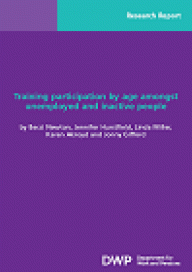Publications
 We author and publish a range of resources to keep you up to date with the latest developments in employment, labour market and human resource policy and practice.
We author and publish a range of resources to keep you up to date with the latest developments in employment, labour market and human resource policy and practice.
All our pdf publications are free to access.
-
📄
The Labour Market Participation and Employment of Disabled People in the UK
Meager N, Hill D | Nov 2005 | Institute for Employment StudiesThis paper represents the contribution by the Institute for Employment Studies to the first stage in a research project on disability and employment, supported by the Norwegian Work Research Institute through a contract from the Norwegian Research Council. The research involves a comparison of disability in three contrasting sectors - construction, ICT and health - in three countries - Britain, the Netherlands and Norway.
-

Evaluation of the Working Neighbourhoods Pilot - Year One
Dewson S | Nov 2005 | Department for Work and PensionsThis report presents the interim findings from the first year of the evaluation of the Working Neighbourhoods Pilot (WNP). The WNP was established in April 2004 to test a new approach to offering intensive support to help people to gain work. The pilot was targeted towards people who were without work, including claimants of Jobseeker's Allowance, Income Support, Incapacity Benefit, partners of claimants and workless non-claimants.
-

Training Participation by Age Amongst Unemployed and Inactive People
Newton B, Hurstfield J, Miller L, Akroyd K, Gifford J | Oct 2005 | Department for Work and PensionsThis project examined the evidence relating to training by age amongst people who were unemployed or economically inactive. The focus was on all adults aged between 16 and state pension age. This report presents the findings of three strands of research: a review of the evaluation and academic literature; analyses of the Labour Force Survey 2004 and National Adult Learning Survey 2002; and 22 interviews with individuals from 16 organisations with in-depth knowledge of the topic.
-

What Employers Look for When Recruiting the Unemployed and Inactive
Skills, Characteristics and Qualifications
Newton B, Hurstfield J, Miller L, Page R, Akroyd K | Oct 2005 | Department for Work and PensionsThis study aimed to examine what employers seek when recruiting, and the extent to which government provision meets their needs. The focus was on unemployed and inactive adults aged between 16 and state pension age. A secondary aim was to explore whether there were differences in employers' requirements by age.
-

New Deal for Disabled People
Survey of Employers
Dewson S, Ritchie H, Meager N | Oct 2005 | Department for Work and PensionsThis report presents the main findings from a representative national survey of nearly 1,500 employers who had recruited individuals registered under the New Deal for Disabled People (NDDP) during the period July 2002 to July 2003. It aimed to provide a quantitative assessment of the nature and scale of employer involvement with the programme, as a complement to two waves of qualitative research with employers (undertaken in 2002 and 2003).
-

Working in Partnership in Higher Education
A report for JNCHES
Neathey F, Regan J, Newton L | Oct 2005 | Universities and Colleges Employers AssociationThis study was part of the HE Working in Partnership project which aimed to develop skills and attitudes amongst managers and union representatives in higher education institutions to enable partnership working to reach local agreements under the terms of the 2004 Framework Agreement for Pay Modernisation. The research comprised a literature review, good practice case studies and the evaluation of pilot workshops facilitated by Acas in ten different higher education institutions.
-
📄
CSR for Employers
Proof of 'Employee Engagement'
Barber L | Sep 2005 | Institute for Employment StudiesThis paper is a write-up of IES's review of employer CSR websites, both in the private and public sectors. The areas represented by the review are training and development; communication and consultation; health and safety; work-life balance; pay and benefits; and the involvement of the HR function.
-

Non-Disclosure and Hidden Discrimination in Higher Education
Strebler M, O'Regan S | Sep 2005 | Institute for Employment StudiesFindings from an anonymised survey of staff working in ten higher education institutions explore patterns of non-disclosure, show how staff attitudes to working in HE vary by personal demographics and occupation, and demonstrate why harassment is an issue that needs urgent attention. This report provides an in-depth view of the findings from the second project in the Higher Education Funding Council's equal opportunities research programme.
-

Beyond the Screen
Supporting eLearning
Pollard E, Willison R | Sep 2005 | Institute for Employment StudiesThis report builds on the previous IES report 'Exploring e-Learning', which, in providing an overview of the subject, identified the importance of supporting learners in this new learning environment. This report examines the literature, explores lessons learnt from the use of e-learning in higher education, and uses case studies of organisations who have been putting e-learning into practice, in order to explore how they can support individuals through all stages.
-
📄
Literature Review of Evidence on e-Learning in the Workplace
Lain D, Aston J | Sep 2005 | Institute for Employment StudiesUndertaken for the Department for Education and Skills, this literature review covers: the prevalence of e-learning in companies; the demand for e-learning; and the effectiveness and impact of e-learning.
